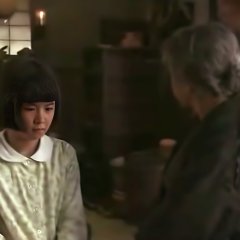 Ask MDL And Now For Something Different: Historical (September)
Ask MDL And Now For Something Different: Historical (September) The story is about two sisters who meet each other again after living separated in Japan and Brazil for 70 years. In 1934, Haru and her family emigrated from Hokkaido to Brazil. Haru's younger sister Natsu, however, was left behind in Japan because of eye disease. 70 years later, Haru visits Japan and locates the whereabouts of Natsu but the younger sister, who thinks she was abandoned by the family, rejects Haru. After a while, the two find out that both wrote numbers of letters to the other through the letters have been left undelivered to the addressees. Through the discovered letters, the sisters learn each other's life; Haru lived in Brazil as a member of an immigrant-labourer family surviving various difficulties while Natsu lived in Japan through the Second World War and postwar economic growth depending on herself and managing a business. The drama portrays the separated sisters' lives full of ups and downs as well as their family ties, asking the meaning of "homeland" and "family." (Source: DramaWiki) Edit Translation
- English
- magyar / magyar nyelv
- dansk
- Norsk
- Native Title: ハルとナツ
- Also Known As: Haru e Natsu
- Screenwriter: Hashida Sugako
- Director: Sato Mineyo
- Genres: Historical, Drama
Cast & Credits
- Yonekura Ryoko Main Role
- Nakama YukieTakakura / Yamabe NatsuMain Role
- Mori MitsukoTakakura Haru [Old]Main Role
- Nogiwa YokoTakakura / Yamabe Natsu [Old]Main Role
- Murata TakehiroTakakura ChujiSupport Role
- Okada YoshinoriNakayama RyutaSupport Role
Reviews
The drama emphasizes how the lack of communication can lead to huge misunderstandings and broken hearts, but also that it’s never to late to make amends and to forgive.
Great plot, acting and soundtrack. The only bad part was the Brazilian grandchild whose Portuguese was awful! Apart from that, it’s a marvelous drama.

Two, it's show both sides of brazilian people. good and bad. And every place in the world have both. But, also show how they learn to live and love this country. A place that with time they star call home.
They made a complete new home outside Japan. They made with they had a Japan in Brazil. Now, they belong to both culture. Now we made part of the nippo-brazilian culture, and this is what define us. Two countries in one place.



















































